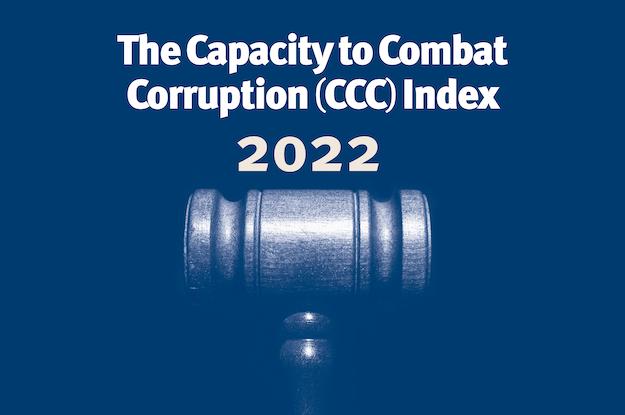Ranking
Scores across the region
Country
Overall Ranking
Scores across the region
Country
Argentina
6
OVERALL
RANKING
Overall Score
5.04
20225.16
20215.32
20205.33
20194.13 | Legal Capacity |
|---|---|
6.01 | Democracy and Political Institutions |
7.23 | Civil Society and Media |
Argentina’s overall score decreased by 2%, continuing the country’s three-year downward trajectory in the Index and leading to a fall from 5th to 6th in the 2022 ranking. Argentina registered slight improvements in all categories except for legal capacity, which had an 8% setback. Its score in the independence and efficiency of anti-corruption agencies fell for the third year running, placing Argentina 12th regionwide in that variable. The country registered improvement in the civil society and media category, where it ranks second in the region behind only Uruguay.
Bolivia
14
OVERALL
RANKING
Overall Score
2.57
20222.43
20212.71
20201.75 | Legal Capacity |
|---|---|
3.72 | Democracy and Political Institutions |
4.01 | Civil Society and Media |
As it has done since 2020, Bolivia scored above only Venezuela in the CCC Index. Modest gains were made in the legal capacity and civil society and media categories, although Bolivia still ranks 14th and 15th respectively in those categories. Bolivia had an almost 7% decline in the democracy and political institutions category, reflecting tensions between the opposition and members of the ruling Movimiento al Socialismo (MAS) party. Critics have observed that the politically motivated use of the justice system has continued during President Luis Arce’s term.
Brazil
10
OVERALL
RANKING
Overall Score
4.76
20225.07
20215.52
20206.14
20194.73 | Legal Capacity |
|---|---|
3.86 | Democracy and Political Institutions |
6.42 | Civil Society and Media |
Brazil declined in the Index for the third consecutive year, falling from 6th place in 2021 to 10th in 2022. Its overall score is down 6% since last year and has fallen by 22% since 2019. Brazil’s legal capacity score declined by 8%, but the country stayed above the regional average in that category, indicating that setbacks over the past three years have not fully reversed decades of institutional strengthening. Brazil saw its steepest decline in the variable assessing lawmaking and ruling processes.
Chile
3
OVERALL
RANKING
Overall Score
6.88
20226.51
20216.57
20206.66
20196.42 | Legal Capacity |
|---|---|
7.88 | Democracy and Political Institutions |
7.10 | Civil Society and Media |
Chile’s overall score increased by 5%, but its upward trajectory did not keep pace with Costa Rica’s, leading to Chile’s drop from 2nd place in 2021 to 3rd place in 2022. The country maintained its 3rd place ranking in the legal capacity category, which saw an 8% score increase year-on-year, bolstered by improvement in the variable assessing anti-corruption agencies’ independence and efficiency. As in 2021, Chile outperformed the regional average in almost all of the variables analyzed. The country is in the process of drafting a new Constitution that will include measures covering corruption and governance issues.
Colombia
8
OVERALL
RANKING
Overall Score
4.87
20224.81
20215.18
20205.36
20194.69 | Legal Capacity |
|---|---|
4.41 | Democracy and Political Institutions |
6.42 | Civil Society and Media |
Despite a small improvement in its overall score, Colombia fell from 7th to 8th place in the Index overall. Colombia advanced slightly in the civil society and media and legal capacity categories, but declined by 6% in the democracy and political institutions category. Anti-corruption rhetoric has been common across the political spectrum in the 2022 election season, reflecting citizens’ demand for reforms. Colombia showed significant improvement in civil society mobilization against corruption, continuing an upward trajectory in that variable since 2019.
Costa Rica
2
OVERALL
RANKING
Overall Score
7.11
20226.45
20216.43
20207.12 | Legal Capacity |
|---|---|
7.63 | Democracy and Political Institutions |
6.14 | Civil Society and Media |
Costa Rica saw a 10% year-on-year growth in its overall score, surpassing Chile for the first time to rank second behind Uruguay. The country registered moderate improvement in both the legal capacity and democracy and political institutions categories, where it ranks among the top three regionwide. Popular disillusionment with the political class likely contributed to an almost 7% setback in the civil society and media category. Costa Rican authorities have announced recent high-profile investigations into alleged corruption schemes between construction companies and public officials.
Dominican Republic
5
OVERALL
RANKING
Overall Score
5.19
20224.38
20213.26
20205.23 | Legal Capacity |
|---|---|
4.66 | Democracy and Political Institutions |
5.95 | Civil Society and Media |
The Dominican Republic continued its rise in the CCC Index, climbing from 10th place in 2021 to 5th place in 2022. The country’s overall score improved by 18% since 2021, boosted by 24% growth in the legal capacity category and significant advancement in the variables assessing international cooperation and anti-corruption agencies. These gains reflect President Luis Abinader’s anti-corruption push since he entered office in 2020. His administration has proposed a law to promote transparency in public contracts, instituted compliance programs in public institutions and enacted a law to simplify bureaucracy.
Ecuador
9
OVERALL
RANKING
Overall Score
4.82
20224.77
20214.19
20204.66 | Legal Capacity |
|---|---|
4.72 | Democracy and Political Institutions |
5.70 | Civil Society and Media |
Ecuador’s overall score is practically unchanged since 2021, indicating a stable anti-corruption environment since Guillermo Lasso became president in May 2021. The country registered moderate growth in the democracy and political institutions category, reflecting some of Lasso’s efforts to combat corruption. These include a decree that regulates and restricts nepotism, improper use of public resources and conflicts of interest, as well as a new judicial unit specialized in combating corruption and organized crime.
Guatemala
13
OVERALL
RANKING
Overall Score
3.38
20223.84
20214.04
20204.55
20193.09 | Legal Capacity |
|---|---|
3.11 | Democracy and Political Institutions |
5.05 | Civil Society and Media |
Guatemala’s overall score dropped by almost 12% year-on-year, and it remained in 13th place, scoring ahead of only Bolivia and Venezuela. The country experienced setbacks in all three categories, but the most significant was a 17% decrease in legal capacity, which has been on a downward trajectory since 2019. Guatemala experienced particularly steep declines in the variables evaluating anti-corruption agencies and the independence of the chief public prosecutor’s office, reflecting recent acts from the administration of President Alejandro Giammattei.
Mexico
12
OVERALL
RANKING
Overall Score
4.05
20224.25
20214.55
20204.65
20193.68 | Legal Capacity |
|---|---|
3.72 | Democracy and Political Institutions |
6.22 | Civil Society and Media |
Mexico fell from 11th to 12th place in the Index, and its overall score continued on a downward trend, dropping by almost 5% in 2022, and by 13% since 2019. The country experienced setbacks in all categories, but the steepest decline was within democracy and political institutions. In that category, Mexico had a sharp drop in the variable assessing lawmaking and ruling processes, reflecting the executive branch’s perceived efforts to interfere in judicial and legislative matters.
Panama
7
OVERALL
RANKING
Overall Score
4.96
20224.55
20214.17
20204.62 | Legal Capacity |
|---|---|
5.39 | Democracy and Political Institutions |
5.67 | Civil Society and Media |
Panama registered modest improvements and had 9% growth in its overall score, rising from 9th place in 2021 to 7th place in 2022. The country saw slight advancements across all three categories, improving most in the variables assessing lawmaking and ruling processes, digital communications and social media, and judicial independence and efficiency. AML enforcement is a persistent challenge for Panama. In 2022. the Financial Action Task Force decided to keep Panama on its grey list and the European Union kept Panama on its list of non-cooperative countries for tax purposes.
Paraguay
11
OVERALL
RANKING
Overall Score
4.45
20224.08
20213.88
20204.17 | Legal Capacity |
|---|---|
4.32 | Democracy and Political Institutions |
5.82 | Civil Society and Media |
Paraguay rose from 12th to 11th place in the Index in 2022. Its overall score maintained an upward trajectory for the second consecutive year and increased by 9% in 2022. Paraguay registered a 13% improvement in the legal capacity category, rising from 13th to 10th place regionwide. Within that category, the country had a sharp increase in the variable assessing the level of international cooperation on law enforcement. Despite these gains, Paraguay remains among the lowest performing countries in the Index, and the politicization of judicial institutions is perceived as a persistent challenge.
Peru
4
OVERALL
RANKING
Overall Score
5.66
20225.66
20215.47
20205.17
20195.61 | Legal Capacity |
|---|---|
5.38 | Democracy and Political Institutions |
6.35 | Civil Society and Media |
As in 2021, Peru placed fourth in the Index, and its overall score and category scores remained stable. The country saw a 9% setback in the variable measuring lawmaking and ruling processes, reflecting persistent tensions between the executive and legislative branches. Since entering office in July 2021, President Pedro Castillo has faced a series of impeachment motions, and his administration has struggled to create a consensus around its reform agenda. Peruvian judicial institutions have maintained incremental progress in anti-corruption proceedings.
Uruguay
1
OVERALL
RANKING
Overall Score
7.42
20227.80
20217.78
20207.03 | Legal Capacity |
|---|---|
8.23 | Democracy and Political Institutions |
7.66 | Civil Society and Media |
Despite an almost 5% dip in its overall score, Uruguay maintained its first-place Index ranking, which it has held since 2020. While Uruguay’s scores in the democracy and political institutions and civil society and media categories remained stable, the country had a 7% score drop in the legal capacity category. The Urgent Consideration Law (LUC), which was ratified in a March referendum, may lead to modifications to the country's legal framework. According to some observers, these changes have the potential to hamper, to some extent, Uruguay’s capacity to tackle money laundering.
Venezuela
15
OVERALL
RANKING
Overall Score
1.63
20221.40
20211.52
20201.71
20190.92 | Legal Capacity |
|---|---|
1.32 | Democracy and Political Institutions |
5.23 | Civil Society and Media |
Venezuela remained in last place and continues to lag far behind other countries covered in the Index. Its overall score increased moderately since 2021, albeit from a very low base of comparison. The CCC Index evaluates the de facto Nicolás Maduro regime, not the de jure interim government recognized by some in the international community. A 37% increase in the variable assessing digital communications and social media contributed to this modest overall improvement, reflecting the growing diversity and sophistication of online media outlets that continue to denounce state corruption.




